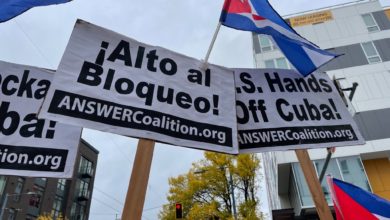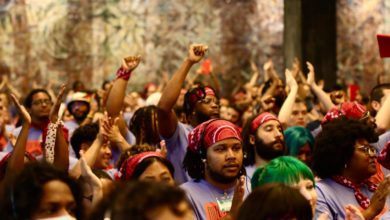Two New York City councilmembers unveiled the “End Cuba Blockade and Travel Restrictions Bill” on the steps of City Hall Thursday morning. The bill advocates ending the U.S. blockade of Cuba, which began 59 years ago, and for the normalization of relations between the two countries. The bills also calls for people of the United States to be able to freely travel to Cuba like people of every other country in the world are already able to do.
The United Nations found last year that the blockade has cost Cuba over $130 billion over six decades. The gross domestic product of Cuba is $87 billion. Under U.S. laws, any company or country is prohibited from doing business with Cuba if it also wishes to do business with the United States. When forced to choose between trading with the world’s largest economy and the small island nation of Cuba, most countries and companies must pick the United States, thereby isolating the Cuban economy and subjecting it to extreme price hikes for international trade. The blockade has caused shortages of food, fuel, medicine, and other vital necessities.
The most harmful of U.S. measures was Trump’s recent implementation on May 2 this year of Title III of the 1996 Helms-Burton law. It had been suspended by presidents since Clinton’s signing of Helms-Burton. Now in effect, Title III entitles any U.S. corporation or individual — even a Cuban individual who became a U.S. citizen after 1959 — to sue any corporation or individual in the world that invests in former U.S. property in Cuba. All U.S. properties were expropriated in the early 1960s by the revolutionary government in Cuba’s exercise of independence and sovereignty. Although Cuba offered compensation, the U.S. government prohibited U.S. entities from accepting such payment.
Now, Carnival Cruise Lines, American Airlines and LATAM airlines are being sued today, for using Cuba’s ports and airports that used to be capitalist property. The obvious intent of Title III and Helms-Burton is to strangle Cuba’s economy. And the U.S. government has blocked Venezuela’s oil from reaching Cuba by way of threatening the ships with sanctions.
Rosemari Mealy, a member of the CubaSí coalition, explained to Liberation the potential impact of the bill: “This proposed resolution, and it will be a piece of legislature, is significant because it’s being introduced by three City Councilmembers in a major metropolitan area in the United States of America. It’s coming on the heels of the UN debate that’s coming up on November 5th and 6th where consecutively, the global community has supported ending the blockade.”
Since taking office, President Donald Trump has imposed further restrictions on travel to Cuba, by eliminating the previously operational “people-to-people” category for individual and group travel. There is a misconception that people in the United States can no longer travel to Cuba. Traveling to Cuba is allowed as long as the traveling group meets certain conditions and falls under certain categories. However, the restrictions have caused a decrease in travel by people from the United States.
The blockade was enacted to collectively punish Cubans for daring to overthrow U.S.-backed dictator Fulgencio Batista and nationalize U.S. holdings. The explicit goal of the U.S. blockade was to make life in Cuba so intolerable that people would end up revolting against the socialist government, and to dissuade poor people across the world from trying to emulate the Cuban Revolution. On both scores it has failed. Despite the blockade, Cuba continues to guarantee medical care, higher education and other social needs as human rights, rather than commodities only available to those who can pay for them.
Every year, the United Nations General Assembly votes overwhelmingly in favor of condemning the cruel and illegal blockade of Cuba. Last year, the vote was 191-2 in favor of condemning the blockade. The two votes against condemning the blockade came from the United States itself and apartheid Israel. The bill, co-sponsored by council members Inez Barron, Ydanis Rodrigues and Jimmy Van Bramer, emphasizes that the U.S. vote in such bodies, and the blockade itself, does not represent the feeling of the majority of people in the United States.





